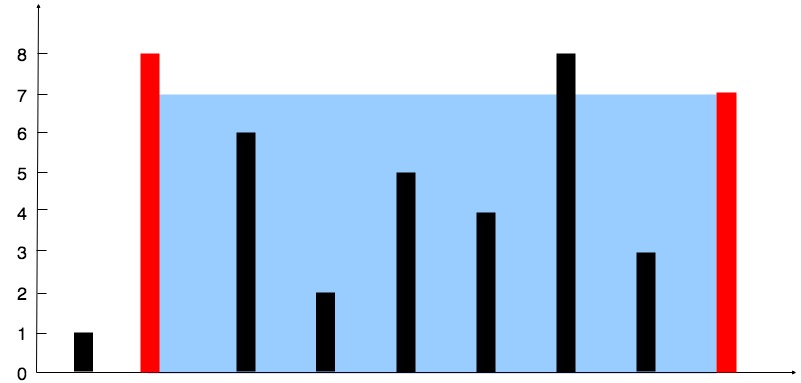Given n non-negative integers a1, a2, ..., an , where each represents a point at coordinate (i, ai). n vertical lines are drawn such that the two endpoints of line i is at (i, ai) and (i, 0). Find two lines, which together with x-axis forms a container, such that the container contains the most water.
Note: You may not slant the container and n is at least 2.

The above vertical lines are represented by array [1,8,6,2,5,4,8,3,7]. In this case, the max area of water (blue section) the container can contain is 49.
Example:
Input: [1,8,6,2,5,4,8,3,7] Output: 49
思路:
最左与最右分别设置两个点:l,r,
设它们的高为:hl,hr
先记录一次面积:
area = (r-l)*min(hl,hr)
即为:两点间的距离*两者之间最矮的高度
假设在l,r原始点之内仍有可能存在更大的面积组合:
因为要往里找新的l,r组合,长度(r-l)是一直在缩小的,如果存在更大面积,则一定存在更长的高,则min(*hr,*hl)>min(hr,hl)
假设一开始,hr > hl, area = (r-l) * hl ;如果存在更大面积, 则*hl > hr, *area = (r-*l) * hr,因hr > hl, *area有可能会大于原面积
假设,hr < hl, area = (r-l) * hr ;如果存在更大面积, 则*hr > hl, *area = (*r-l) * hl, 因hl > hr, *area有可能会大于原面积
如果hl == hr 怎么办?
不断同时移动两个点,直到新的lr的高度同时大于原来的高度:
因为r-l一直在缩小,min(hl,hr)必须变大,所以hr,hl要同时变大才,有机会超越原来的面积。
class Solution(object):
def maxArea(self, height):
"""
:type height: List[int]
:rtype: int
"""
l,r = 0, len(height)-1
box = [self.getarea(height, l, r)]
while l < r:
if l < r and height[l] < height[r]:
l += 1
if l < r and height[l] > height[l-1]:
box.append(self.getarea(height, l, r))
if l < r and height[l] > height[r]:
r -= 1
if l < r and height[r] > height[r+1]:
box.append(self.getarea(height, l, r))
if l < r and height[l] == height[r]:
now = height[l]
while l < r and now >= height[l]:
l += 1
while l < r and now >= height[r]:
r -= 1
box.append(self.getarea(height, l, r))
return max(box)
def getarea(self, height, l, r):
return (r-l)*min(height[l], height[r])